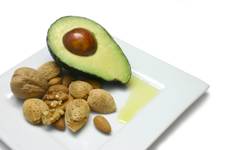Fat
Fat is always thought of as bad for people, especially athletes'. However, fat is an important nutrient and should be part of a balanced healthy diet. The two main types of fat are saturated and unsaturated fat.
Sources of fat
Saturated fat can be bad for a person in large quantities and so is known as the 'unhealthy' type of fat. Examples include lard, butter, crisps, cookies, chocolate and fat found in meat.
Unsaturated fat is a healthier form of fat because it also contains chemicals that help the body function properly. Examples include olive oil, avocado and nuts.
The recommended intake of fat as part of a person's total daily food intake is 30%.
Fat contains 9 kilocalories per gram (a kilocalorie is a way of expressing the energy within food) this means that stores of fat in the body are a huge reserve of energy.
Fats can be found almost everywhere in the body, and have a number of functions:
- Fats are stored in the body as part of the skin and act as a fuel for cells and an energy reserve.
- Fats are carriers for fat soluble vitamins.
- Fats provide a protective layer around vital organs.
- Fats help insulate the body against heat loss and are part of the structure of brain and nervous system.
- Fats are involved in the production of hormones within the body, so they influence a whole range of body functions.
- Fats are part of the structure of skin and hair - they ensure that skin is healthy, flexible and glowing, while also ensuring that hair is sleek and glossy.
Fat issues
Fat is an essential nutrient in a balanced healthy diet, but too much fat can have serious effects on health. Too much fat in a diet can lead to obesity and lots of diseases linked to being obese. These diseases include coronary heart disease (CHD).

